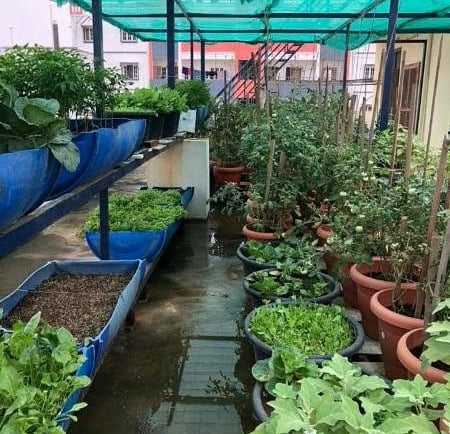Kitchen Gardening and Gandhian Philosophy: A Path to Self-Reliance 🌱
Mahatma Gandhi often reminded us that “the greatness of a nation can be judged by the way its people live in harmony with nature.” His vision of Swaraj was not only political freedom but also a life of self-reliance, simplicity, and dignity of labour. In today’s context, one of the simplest ways to practice Gandhian philosophy at home is through kitchen gardening.
8/26/20252 min read


Mahatma Gandhi often reminded us that “the greatness of a nation can be judged by the way its people live in harmony with nature.” His vision of Swaraj was not only political freedom but also a life of self-reliance, simplicity, and dignity of labour. In today’s context, one of the simplest ways to practice Gandhian philosophy at home is through kitchen gardening.
Kitchen Gardening: The Gandhian Way of Living
Kitchen gardening is more than just growing a few vegetables in your backyard, rooftop, or balcony. It reflects the Gandhian ideals of swadeshi, sustainability, and health. Gandhi believed that every household should meet its own basic needs without over-dependence on the market. By growing our own food, even in small amounts, we take a step toward that vision.
1. Self-Reliance in Health
Fresh, chemical-free vegetables from one’s own garden mean fewer pesticides in our bodies and stronger immunity. Gandhiji emphasized natural living and preventive care over expensive medical treatments. A kitchen garden ensures nutritious, seasonal, and organic food – a direct contribution to better health for the whole family.
2. Self-Reliance in Economy
When households grow even a part of their food needs – spinach, coriander, tomato, brinjal, or chillies – the daily expense on vegetables reduces. Gandhi always advocated for “production by the masses, not mass production.” Kitchen gardening perfectly reflects this: small-scale production at home that collectively strengthens the economy by reducing dependence on industrial agriculture.
3. Simplicity & Dignity of Labour
Tending a garden requires patience, daily care, and humility. Gandhi considered manual work essential for human dignity. Kitchen gardening not only provides food but also cultivates discipline, responsibility, and joy in physical labour.
4. Harmony with Nature
Gandhi’s philosophy of living in tune with nature finds direct expression in gardening. Composting kitchen waste, conserving water, and growing local varieties of plants create a natural cycle of use and renewal.
Kitchen Gardening in Today’s Urban World
In modern cities filled with concrete, rooftops and balconies can become green sanctuaries. By adopting simple gardening practices – container planting, vertical gardens, or hydroponics – urban households can revive Gandhiji’s idea of “Gram Swaraj” at the household level.
Imagine if every family in a city grew just 20% of its own vegetables – the collective impact on health, economy, and environment would be revolutionary.
The Gandhian Message for Us
Kitchen gardening is not only about saving money or eating fresh; it is about embracing self-reliance, sustainability, and simplicity – values Gandhiji lived by. It reminds us that true independence is not merely political but also lies in our ability to feed, heal, and sustain ourselves with dignity.
🌿 In nurturing a kitchen garden, we nurture Gandhiji’s dream of self-reliant India
